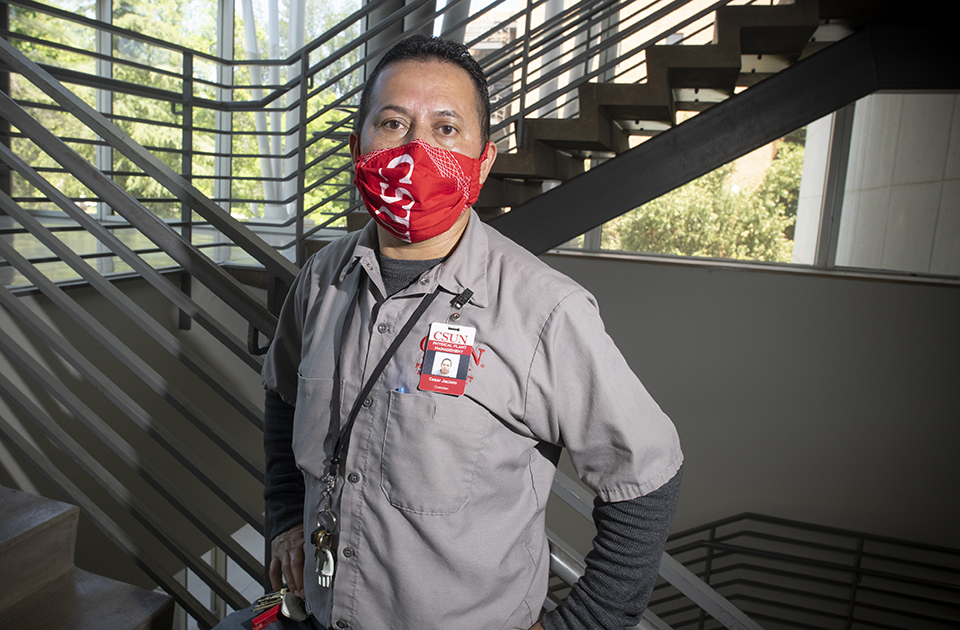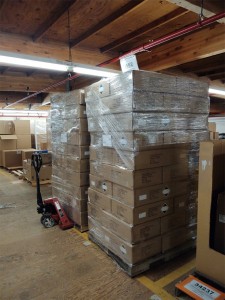For Those Few Coming to Campus, CSUN Adopts New Cleaning and Safety Measures

Cesar Jacinto, CSUN custodian. Photo by Lee Choo.
To help ensure the health and safety of the small number of students in classes that will conduct activities on CSUN’s campus — and the small percentage of employees who work on-site — the university has instituted a system of safety protocols and cleaning procedures that help minimize the risks.
Employees and students must be screened before they come to campus, and once there they must follow social distancing and masking protocols. Meanwhile, CSUN’s Physical Plant Management (PPM) employees have invested in the latest cleaning supplies, and shifted custodian hours and the focus of their efforts, to help reduce risk of encountering the virus that causes COVID-19.
“Facilities Planning, Physical Plant Management, and Environmental Health and Safety have been busily assessing and preparing the University to ensure the safety of the campus community for the eventual return of faculty, staff, employees and students, whether limited, or in some type of phased re-population,” said Ken Rosenthal, associate vice president for Facilities Development and Operations. “Our top priority, and mission, is ensure we’ve done everything possible to promote a safe environment for the campus.”
Primarily virtual
Details for a primarily virtual fall semester are provided on a website that is continually updated. The “CSUN as One” website includes the campus’ fall 2020 instruction and operational plans, including safety protocols.
In the fall, only a small number of classes will hold any on-campus activities. All on-campus plans must be reviewed by Dr. Linda Chassiakos, director of CSUN’s Klotz Student Health Center, and Tony Pepe, director of Environmental Health and Safety.
The number of employees who will work on-site is still undetermined, but the goal is still to keep as many employees and students off-site as possible, said Toni Strauja, CSUN’s director of Employee Relations. This summer, as few as 160 of the university’s 4,000 employees were working on-site.
Each department has assigned a “COVID-19 Coordinator” who will schedule space assessments, provide resources and support, and disseminate important updates and information.
Safety measures

A shipment of 2,400 surface wipes to be used to help disinfect CSUN during the COVID-19 pandemic.
CSUN also screens all students and employees before they are permitted on campus. Employees and students must fill out a survey that checks for symptoms or risk factors for COVID-19. They must take their temperature and report if they’re at or above 100.4 degrees.
Once on campus, students and employees must wear appropriate face coverings (employees can remove them while in a private office or cubicle with 6-foot distancing). They must also adhere to 6-foot distancing and hand-washing requirements.
Over the summer, PPM acquired 2,400 tubs of surface wipes, spray bottles, cleaning products, Lysol spray, more than 17,000 face coverings, more than 6,000 thermometers, face shields, gloves, personal-sized sanitizer gel, bulk sanitizer gel, and automated sanitizer dispensers and dispenser stands that have been placed around occupied buildings throughout campus. PPM also distributed approximately 1,000 COVID kits — including hand sanitizer, disposable masks, gloves and other PPE — to offices and labs.
Sanitation plans
CSUN PPM has re-thought all its operations to help slow the spread of the virus.
It shifted up to 24 custodial staff from nights to days to disinfect high-touch surfaces in teaching labs, restrooms and occupied buildings throughout the week, and has an additional 39 employees to perform similar duties during the 4 p.m.-12 a.m. shift.
PPM acquired the latest cleaning technology to fight COVID-19, including disinfection sprayers, electrostatic misters that clean surfaces, and mass disinfection foggers to assist with large-scale disinfection, as well as assist when a deep cleaning is required. PPM also increased the use of high-pressure mass disinfection units for restroom sanitization. All campus vacuum cleaners have been replaced with HEPA units.
CSUN has also examined its system to reduce the risk. Every HVAC unit on campus was inspected, and PPM is in the process of ensuring that all units use filters that meet the highest recommended standards.
CSUN’s PPM Reprographics printing and sign-making services produced about 3,000 signs to inform the campus community about safety protocols, including distancing floor stickers, door signage and hand-washing reminders.
CSUN also has developed a matrix to identify extra cleaning and safety measures for the event that a person who has been on campus is positive for or suspected of COVID-19. For example, if a positive or suspected person has been in a building within 72 hours, the building may need to be closed for up to 72 hours in addition to a thorough cleaning.
Employees on campus this summer have told CSUN Today that the safety protocols have helped them feel comfortable at work.
“I’m hearing that a lot of our staff do feel safe,” said Jason Wang, Physical Plant Management senior director. “The measures we’re taking are for everyone’s sake. From a safety perspective, it’s paying off.”

 experience
experience